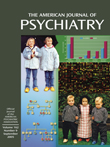Psychiatric Comorbidity in Adult Attention Deficit Hyperactivity Disorder: Findings From Multiplex Families
Abstract
OBJECTIVE: Patterns of psychiatric comorbidity were assessed in adults with and without attention deficit hyperactivity disorder (ADHD) identified through a genetic study of families containing multiple children with ADHD. METHOD: Lifetime ADHD and comorbid psychopathology were assessed in 435 parents of children with ADHD. Rates and mean ages at onset of comorbid psychopathology were compared in parents with lifetime ADHD, parents with persistent ADHD, and those without ADHD. Age-adjusted rates of comorbidity were compared with Kaplan-Meier survival curves. Logistic regression was used to assess additional risk factors for conditions more frequent in ADHD subjects. RESULTS: The parents with ADHD were significantly more likely to be unskilled workers and less likely to have a college degree. ADHD subjects had more lifetime psychopathology; 87% had at least one and 56% had at least two other psychiatric disorders, compared with 64% and 27%, respectively, in non-ADHD subjects. ADHD was associated with greater disruptive behavior, substance use, and mood and anxiety disorders and with earlier onset of major depression, dysthymia, oppositional defiant disorder, and conduct disorder. Group differences based on Kaplan-Meier age-corrected risks were consistent with those for raw frequency distributions. Male sex added risk for disruptive behavior disorders. Female sex and oppositional defiant disorder contributed to risk for depression and anxiety. ADHD was not a significant risk factor for substance use disorders when male sex, disruptive behavior disorders, and socioeconomic status were controlled. CONCLUSIONS: Adult ADHD is associated with significant lifetime psychiatric comorbidity that is not explained by clinical referral bias.



